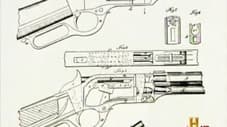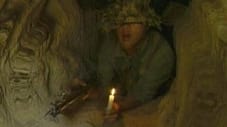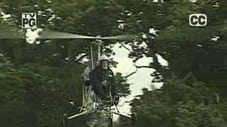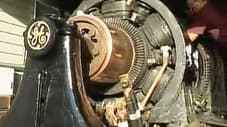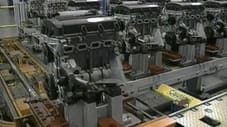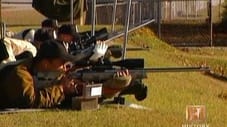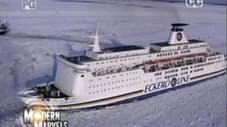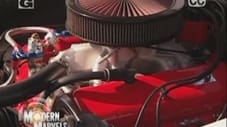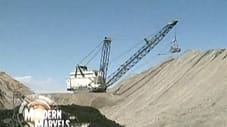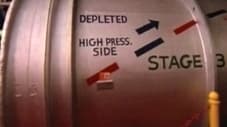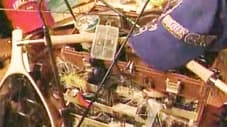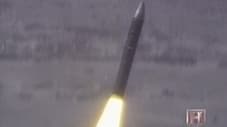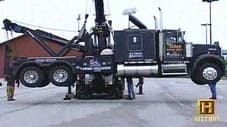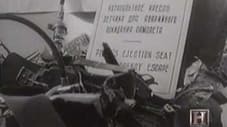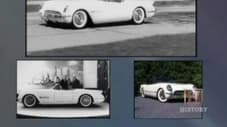
Season 9 (2002)
← Back to season list
Episodes 60
Breweries.
From Pilgrim brew masters to early commercial ventures to today's monolithic corporations, we'll imbibe American beer's long history, focusing on the commercial brewing industry that developed in the 19th century and continues to today. We'll also taste social experiments from the past, like the Temperance Movement and Prohibition, to see how they left scars on the industry and continue to influence sobriety today.
Read MoreWar Planes of World War II
Flight was born in America at the turn of the 20th century. But WWII saw more planes built in a single year–300,000–than had been built in the previous 40. Footage of restored aircraft, historic film ranging from factory floors to dogfights, and interviews with pilots and designers recapture the aviation industry's finest hour.
Read MoreThe Winchester
Winchester…the name still evokes images of the Wild West and the taming of the frontier–it was the first reliable repeating rifle and settlers brought it along as they moved west. Prized by Civil War soldiers, the lever-action rifle was preferred by lawmen and outlaws alike. A classic Winchester can command upwards of $100,000 from collectors trying to buy a piece of the Old West. We see how a shirt manufacturer named Oliver Winchester became the most famous gun maker of the American West.
Read MoreBig Rigs of Combat: Tanks and Jeeps
The rousing story of the tank, from its primitive appearance in WWI to the high-tech world of modern tank warfare, with emphasis on the tank’s Golden Age during WWII. In the second hour, we’ll look at the American soldier’s best friend in WWII–the Jeep. A “Blitz Buggy” could serve as a combat car, snowplow, or ambulance!
Read MoreTunnels of Vietnam.
Here is the heroic story of a intrepid band of infantry soldiers, the "Tunnel Rats", charged with a daring mission–to search for, find, and destroy a secret subterranean network of enemy tunnels in Vietnam. Armed with only a flashlight, valor, and a .45, they faced a determined foe and overcame lethal odds, uncovering secret enemy arms and intelligence caches. Tragically, many of these volunteers died and others were seriously wounded on this terrifying suicide mission.
Read MoreHelicopters
From the early “egg beaters” of World War II to the “flying tanks” of Operation Desert Storm, we’ll fly aboard one of the most agile and potent weapons on the battlefield–the helicopter. Meet the first pilot to fly a combat rescue mission in WWII and a U.S.A.F. female aviator; and view classified footage of the Apache in Iraq.
Read MorePrivate Jets
From today’s ultra chic, state-of-the-art private jets to Lockheed’s 1957 Jetstar, this 2-hour special investigates the history, the luxury, and technology of America’s corporate jets. We meet a few of the men and women who pioneered them–Bill Lear, Clyde Cessna and his nephews, Walter and Olive Beech. Actor Michael Dorn explains what it takes to buy a previously-owned jet. And, we see the latest in kit jets and look into the new must-have of the super rich–jets the size of commercial airliners.
Read MoreJames Bond Gadgets.
His movies are legend, his women beautiful, and his toys the best in the world. Whether James Bond is foiling villains in space-age flying machines or eavesdropping on his enemies with ultra-sophisticated spy gear, British Secret Agent 007 is always guaranteed to have the most outrageous and wonderfully creative gadgets ever to grace the silver screen. Bond had it all. But as we see in this exclusive look at his gadgets, it takes a lot to save the world!
Read MoreRemote Control
Press a button and you can soar in the sky, command a virtual pet, adjust the thermostat in your house while driving in your car, and, of course, change the channel on your TV. The remote control revolution began in 1898, when inventor Nikola Tesla successfully controlled a 6-foot-long iron-hulled model boat using radio waves. Today, Microbots are the latest remote control marvel. We'll see how, in our technologically-evolved world, pressing a button to get what we want has become commonplace.
Read MoreMillion Dollar Tech
For millennia, luxury toys have functioned as flashy instruments of affluence, authority, and identity and driven many kingly consumers to covet, create, and purchase these status symbols. From the Roman Emperor Caligula’s special barges to Carl Faberge’s impossibly intricate eggs, from plasma screen TVs to $600,000 Bentleys and Rolex watches, we examine spectacular personal possessions–paeans to the lords of a consumer culture that grows richer and technologically more sophisticated daily.
Read MorePleasure Boats
As we power-up and unfurl the sails on a magical cruise through time, viewers meet the people who’ve devoted their lives to pleasure boating. Traveling throughout the U.S. and Europe, we delve into a world of luxury, adventure, and sport on spectacular vessels ranging from classic yachts to sports boats to the ultimate floating palaces. In this timeless pastime, technological wonders continue to evolve and enthrall.
Read MoreBulletproof.
How do you stop a speeding bullet? From body armor to armored cars and trucks, we review the history of the race between the bullet and a successful way to stop it. It's not exactly easy to design material that can catch gunfire traveling up to 3,000 feet per second. We'll look at little-known advances like bulletproof layering hidden in walls, futuristic smart materials that "remember" how to stop a bullet, and a system that deploys a shield within milliseconds when it detects an oncoming round.
Read MoreSiege Machines.
A look at siege machines that convert energy into mechanical force to go over, under, or through fortified or fixed defenses too strong for conventional force. These engines range from man's first long-range missile weapon, the slingshot, to the laser cannons and satellite-destroying robots of the 21st century. All of these machines are designed to breach barriers–castle walls, entrenched troops, even outer space. When the going gets tough, the tough get siege machines.
Read MoreThe Junkyard
It’s the place where one man’s trash is truly another man’s treasure. Enter the strange and mysterious world of the junkyard, where many pieces actually do add up to a whole. Uncover how junkyard operators create order out of seemingly random piles of junk.
Read MoreThe F-14
October 7, 2001: Missiles from lethal U.S. jets rain down onto Afghanistan. One powerful and deadly plane led the majority of the assaults–the F-14 Tomcat, the world’s most complete military fighter. No other fighter jet carries the F-14′s unique combination of weapons. Its state-of-the-art system can spot an oncoming enemy plane at almost 200 miles. Its radar can detect targets as low as 50 feet and as high as 80,000 feet and does so three times faster than the radar of any other fighter jet.
Read MoreEngines
Story of the development of engines and motors, with particular emphasis on the ones that have profoundly changed society. Beginning with the steam engine, we see how it was created, how it works, and how it led to the Industrial Revolution. We review the electric motor, internal combustion engine, jet engine, and rocket engine, and conclude with a look at futuristic engine technologies, including hydrogen-powered cars and microtechnology engines so small that they fit on the tip of a finger.
Read MoreThe Magnum
It’s known as the most powerful handgun in the world, made famous by Clint Eastwood in the Dirty Harry movies. But its origins stretch back more than a century to the Indian Wars of the American West and African safaris, where hunters stalked big game. Join us for a review of the history of the biggest, baddest gun available today–unlimited firepower at the pull of a trigger!
Read MoreThe Wheel
Spinning your wheels isn’t just going around in circles. In fact, it’s revolutionary–literally. The history of civilization has turned on the wheel, and we have traveled as far as we have because of it. One of the six simple machines and perhaps the most important invention in the history of mankind, the wheel has been essential in all aspects of life–from farming to fighting, traveling to trading. Features interviews with scientists, historians, philosophers, millers, potters, and spinners.
Read MoreStar City
Star City, the Gagarin Center for Training Cosmonauts, was established by the former Soviet Union in the 1960s as a school for the future conquerors of space. Today, it’s where Russian cosmonauts and international guests train on Soyuz rocket simulators and the MIR complex simulator. We join cosmonauts as they undergo grueling ground training in survival courses and parachuting, and face some of Star City’s toughest challenges–G-Force simulators, space orientation, and rescue training.
Read MoreIce Breakers
They are the toughest ships in the water, plowing headlong into one of nature’s hardest obstacles. Modern icebreakers can smash through 10-foot thick ice sheets without stopping, allowing scientists and commercial shipping access to some of earth’s most inhospitable spots. Join our bone-chilling journey as we patrol the Great Lakes on the USCG Cutter Makinaw and traverse the infamous Northwest Passage on the maiden voyage of the USCG Healy, the newest Polar Class Icebreaker in the U.S. Fleet.
Read MoreFire and Ice.
Who could imagine life without our "man-made weather"? On cold winter nights and hot summer days, we are forever grateful to the visionaries who took two basic elements–fire and ice–and turned them into true modern marvels. Fire warmed the caves and primitive dwellings of mankind for centuries, yet the technology of keeping cool lagged far behind as we learn in this chronicle of heating and air conditioning that covers advancements from the home and industry to outer space and beyond!
Read MoreMuscle Cars
Pop open the hood, check out the carbs, and hear the engines roar as we journey back to a time when gas was cheap, emission controls non-existent, and all that mattered was acceleration and speed. During the 1960s and ’70s, GM, Ford, and Chrysler competed to create high-performance cars at prices teenage baby boomers could afford. Featuring interviews with John DeLorean, creator of the Pontiac GTO, and his marketing partner Jim Wangers, we go behind the scene of the muscle-car wars.
Read MoreAxes, Swords and Knives.
Blade implements have been a part of civilized man's arsenal since the Paleolithic Age, when sharp tools were chipped off of flint or obsidian. But with the discovery of metallurgy, people were able to forge stronger, more versatile blade implements. We visit an axe-throwing contest in Wisconsin for an introduction to the least subtle of the blade tools. Then we visit a swordsmith and an experienced swordfighter who work in traditional methods from ancient sources, and review the history of knives.
Read MoreThe World's Biggest Machines.
Join us for a look at the biggest, heaviest, tallest, longest, meanest machines on the planet! We'll see what these monsters do and how they operate, and how they're designed and assembled. Machines investigated include the largest draglines, excavators used in mining; the biggest dump truck; a front-end loader with an 80-ton bucket and the largest tires of any vehicle; the cruise ship, the Voyager of the Seas; a 240-foot tall wind generator; and a fusion reaction machine the size of a football field.
Read MoreDrag Racing
Legendary drivers lead us on a record-breaking race through a century-long search for sheer acceleration that began before World War One, when hot-rodders modified Model-T Fords to see how fast they could go. Today’s dragsters can cover a quarter-mile from a standing start in 4.5 seconds, hitting top speeds above 330 mph. Top driver Gary Clapshaw shows us how to put together a modern dragster and revolutionary designer Bob Norwood unveils his newest car.
Read MoreThe Manhattan Project.
At 5:30 a.m., July 16, 1945, scientists and dignitaries awaited the detonation of the first atomic bomb in a desolate area of the New Mexico desert aptly known as "Jornada del Muerto" (Journey of Death). Dubbed the Manhattan Project, the top-secret undertaking was tackled with unprecedented speed and expense–almost $30-billion in today's money. Los Alamos scientists and engineers relate their trials, triumphs, and dark doubts about building the ultimate weapon of war in the interest of peace.
Read MoreThe Tackle Box
From ancient Egyptian fishing parties to today's high-tech bass tournaments, we untangle the fascinating technical history of man's quest to seduce creatures of the deep out of their watery world and into the frying pan. We trace the evolution of the basic rod and reel, from crude hickory poles with braided horsehair to ultra-light graphite wonder-rods with space-age nylon line, and examine the angler's glittering arsenal of spinners, spoons, plugs, and flies
Read MoreHunting Gear.
They are lethal tools that ensured our survival, altered our evolution, and maintained our dominion over other animals. Though hunting technology is the backbone of a multi-billion-dollar sports industry, current cutting-edge gear is a far cry from prehistoric man's rudimentary tools. From the crude knife to 24-hour digital cameras that monitor animal movement and earmuffs with microphones to amplify outside noise while blocking gunshot sound, we examine the development of hunting weapons and gear.
Read MoreCamouflage
From ancient hunters’ camouflage to computer-generated digital pattern uniforms, we uncover the past, present, and future of deception through disguise. During an ambush exercise by US Marines, we learn that camouflage came from natural coloration and patterns of flora and fauna. The art of military camouflage took off in WWI with the use of the airplane, when the French learnt to hide from “eyes in the sky”. It’s a world of shadows and smoke, where even cities disappear through disguise.
Read MoreModels
Though they duplicate the real world for fun and fantasy, models are not always toys and they’re not always tiny. We explore the magic of these fascinating replicas–from the Rover and Lander models for the Mars Exploration Project to ancient Egyptian ship models found in tombs to English ship models from the Age of Sail. We also look at the rage for hobby modeling, with Lionel trains leading the pack, watch models go to war with scale warplanes in WWII, and invade science fiction films.
Read MoreHangars
Come in for a smooth landing as we explore the history of hangars–stark, massive structures that house and protect flight vehicles. We visit the first hangar, built on a German lake; Boeing’s Delta 4 rocket hangar; Hangar Number One in Lakehurst, New Jersey, that housed all US airships built in the 1920s and ’30s; and the Space Shuttle’s hangar–as big as four skyscrapers! Back in Germany, Cargolifter’s mammoth hangar, large enough to enclose the Superdome, signals the rebirth of an industry.
Read MoreBeach Technology
Slap on your sun block and head to the ocean for a sizzling hour that explores the beach in a whole new way! We cover everything from Japan’s Seagaia, the world’s largest indoor beach, to boardwalks, dune buggies, surfboards, sunglasses, suntan lotion, wave pools, and more. We examine the development of each product and explain the technological advances that have been made over the years.
Read MoreThe Big Dig
The Massachusetts Central Artery/Tunnel Project, a.k.a. The Big Dig, is the most amazing municipal construction project in U.S. history. Its objective–to replace Boston’s decaying highway infrastructure with 160 new highway miles, half of which run underground and underwater. After 14 years construction, its cost–$11 billion!
Read MoreSuper Guns
They are the cutting edge in firearm technology. They fight simulated battles on computers, decades before a shot is fired. But will they make the world safer…or more dangerous than ever before? They are Super Guns of Today and Tomorrow.
Read MoreStrategic Air Command.
With the ironic motto "Peace is our Profession", the Strategic Air Command was in charge of US nuclear forces from 1946 to 1992. SAC was the ultimate Cold War military machine, at its height controlling thousands of nuclear weapons, planes, and missiles, and boasting over a quarter-million personnel. We travel to the Strategic Air and Space Museum, located 20 miles from SAC's old headquarters in Nebraska, and walk through the cavernous bomb bay of SAC's workhorse, the B-52 Bomber.
Read MoreGasoline
Traces the history and evolution of the world’s most important fossil fuel. Without gasoline, modern life would grind to a halt. Americans use about 360-million gallons of gas every day. And though most of us could not function without gas, very few understand what it really is, how it is made, what all those different octane numbers really mean, and how researchers developed cleaner burning gasoline. All these questions will be answered as we look at the history of this “supreme” fuel.
Read MoreTowing.
Think you know towing? As simple as engaging a tow man when your car is stalled? From mighty tugboats that guide massive ships safely into port, dizzying roller coasters that send cars careening up and down hills, to funicular railroads that climb mountainsides, when it comes to towing, being a "drag" was never so good! We also watch a 125-year-old church as it's towed on the back of a flatbed truck, and rocket towards space as we're hauled 20,000 feet-high behind a Boeing 747!
Read MoreJet Engines
This program will tell the story of jet propulsion, which has radically transformed our world since it was first introduced near the end of World War II. We’ll trace the development of jet-powered aircraft from the Nazi’s first operational fighter, the Me 262, to the supersonic Concorde, to the latest U.S. jet fighter, the F-22 — and beyond, to the fighters and passenger planes of the future, which will be powered by new jet engines on the drawing boards (like the “scram-jet” — designed for a new hypersonic transport plane that would switch to rocket power once outside the earth’s atmosphere).
Read MoreNordhausen
It was the world’s largest underground factory–seven miles of tunnels built to manufacture Hitler’s secret weapons, primarily the V-2 rocket. But Nordhausen kept more than one secret. Technology and torture went hand-in-hand–25,000 concentration camp workers died there–and some of those associated with Nordhausen later helped take America to the moon.
Read MoreWar Trains
Examines how the great 19th-century peacetime invention developed into a powerful war machine, forever altering how, when, where, and why battles were fought. Also looks at the brave men and women who kept the military Iron Horses running, often at their own peril.
Read MoreLiberty Ships of World War II
Between 1941 and 1945, U.S. shipyards built more shipping tonnage than had been previously produced in the history of the world. American industrialists like Henry Kaiser transformed the nation’s shipyards into mass production facilities in a matter of months. Ships that had once taken years to build now only took weeks to construct. This record pace of producing ships is one of the most remarkable stories in the history of American industry. This episode utilizes rare color film obtained from the National Archives as well as principle photography taken on board World War II Liberty Ships and aircraft carriers that remain afloat today.
Read MoreMagnets
We played with them as children, but the world of magnets isn’t kid’s stuff! The pervasive magnet serves as the underpinning for much of modern technology. They can be found in computers, cars, phones, VCRs, TVs, vacuum cleaners, the washer and dryer, the ubiquitous refrigerator magnet, and even in an electric guitar! On the cutting-edge of technology, scientists experiment with a variety of magnets. Magnets’ amazing forces of attraction and repulsion may take us to the far reaches of outer space.
Read MoreThe Chrysler Building.
The 1,046-foot Chrysler Building in New York City, erected between 1928 and 1930, was the world's tallest edifice–until the Empire State Building eclipsed it in 1931! Since then, this Art Deco masterpiece has become one of the most beloved skyscrapers on the city skyline. Financed by auto tycoon Walter P. Chrysler and designed by architect William Van Alen, the private office building was constructed by more than 2,000 men. Find out why it was the first–and last–skyscraper Van Alen designed.
Read MoreThe Autobahn
Imagine a superhighway designed for speed…thousands of miles of roadway unhindered by limits of any kind. Buckle up for safety as we take you for the ride of your life when we explore the fascinating history and current reality of the world’s fastest freeway. The number-one works project of the Third Reich, the Autobahn was known as Adolf Hitler’s Road until Germany’s defeat in WWII. Reconstructed and extended to more than four times its original size, it became a symbol of the New Germany.
Read MoreHome Tech
From the outhouse to the smart house, our lives have improved drastically in the last 150 years. Convenience and comfort have always been considerations in home design. Yet, it is often these everyday appliances and gadgets that we take for granted. In Household Wonders II, we’ll take a peek into one of today’s fully-automated homes that is so smart, the owner can operate everything from the home theater to the outdoor waterfall at a push of one button.
Read MoreCranes
One of the most useful machines ever created, the crane is a simple but important combination of the pulley and the lever. Though cranes have been helping us build civilization from at least the time of the Egyptian pyramids, the modern steel-framed construction cranes are a relatively recent development. Put on your work boots as we ride through the history of cranes from ancient days to skyscraper construction sites, ocean-freighter docks, and the International Space Station.
Read MoreThe Internet: Behind The Web
Over 200-million people around the world use the Internet–yet no one owns or controls it. Its phenomenal usage puts it on a par with the printing press as a civilization-shaping invention. Follow the rise of the Net as a humble defense department research project to its stature as the number one communications tool for the future.
Read MoreSherman Tanks
An exciting series that takes viewers into the heart of action as it focuses on a particular machine from WWII, beginning with the story of its design and manufacture and showing the machine in combat, using vintage archive footage. Miniature cameras take viewers inside the machine to share with its crew the experience of war. In this episode, ride along in the thick of battle in the American M4 Sherman Tank, as it blasts its way into history and paves the way for the liberation of Europe.
Read MoreGreat Train Disasters
Throughout railroad history, disasters lay at the heart of progress since expansion and profit proved the main goals of management. In 1875 alone, an average of 22 train accidents happened daily; in 1890, over 6,000 people were killed. We’ll examine how safety, once a secondary consideration, became a primary goal.
Read MoreSecret Life Of The Crash Test Dummy
The crash test dummy, patron saint of vulnerable motorists, has become a modern icon and is a potent symbol of safety in a risk-obsessed age. But what’s the real story behind this blank-faced semi-human? From a case of mistaken identity in the Roswell UFO incident, to the U.S. military’s top-secret research and development programs of the 1950s, to a series of highly sensitive experiments on humans, animals, and corpses, we chart the bizarre and often gruesome life of this mechanical humanoid.
Read MoreHigh Tech Sex
Join us for a walk on the wild side of the history of sexual enhancement and contraception–from Cleopatra’s box of buzzing bees to 17th-century condoms to Internet sex and 21st-century holographic pornography! In an explicit exploration of the aphrodisiacs, drugs, contraceptives, toys, and cyber-tech innovations that have ushered in a brave new world of modern sexuality, we talk to sexologists and historians for ribald romp behind the bedroom’s closed doors.
Read MoreThe Spitfire
Designed in 1935 by R.J. Mitchell, the Supermarine Spitfire was a revolutionary fighter plane, which proved to be more than a match for its German opponents. In 1940, it helped turn the tide of WWII by providing vital air defense during the Battle of Britain. Combining interviews with surviving Battle of Britain fighter aces, archive film, and reenactments, we take you inside the cockpit to reveal the courage and resolve of the men who halted Hitler’s advance and became legends of the skies.
Read MoreGarbage
Modern Marvels examines the ever-changing nature of trash, the history of our efforts to dispose of unwanted material, and the evolving technology used to rid ourselves of solid waste. It will cover the most current high and low-tech ways to “take out the trash” from recycling’s three “R’s” to the 10 Commandments of “Use Less Stuff,” the current admonition of the garbologists.
Read MoreMore Bond Gadgets
He’s everyone’s favorite spy, the man with a woman in every port and a gadget in every pocket! No villain is too strong, no situation too tough for His Majesty’s Secret Agent, thanks to his wits, cunning, and the best toys on the silver screen. History Channel cameras travel from the Arizona desert to the British countryside to find the best Bond gadgets–including amazing footage from inside the cockpit of the world’s smallest jet and rare home movies taken on the underwater set of Thunderball.
Read MoreLimos
Limousines have been stretched to greater and greater lengths–as has the notion of what can be done inside them! You can have a rolling disco in a stretched SUV, go for a rumble off-road in a monster truck limousine, or take a direct hit in an armored limo and still make your meeting. So, sit back, relax, and enjoy the ride of your life as we review the history of chauffeured limousines–from weddings, proms, and funerals to the ultimate adult playpen and the President’s “Cadillac One”.
Read MoreDigi-Tech
DVD, CD, PDA, HDTV, PVR–they are the ultimate in “gotta have it” gadgets and gizmos and “to die for” technology that populate a digital world of acronyms. We trace digital technology back to the early 1940s and the first high-speed electronic computer used to calculate cannon trajectory charts for new artillery in WWII, and look at the rapidly approaching future in places such as MIT’s Media Lab, where tomorrow’s technologies are being developed today.
Read MoreSalt Mines
It’s the only rock we eat – a priceless commodity essential to our very survival. It has over 14,000 uses – from de-icing our roads to softening our water. We dynamite it from vast caverns deep beneath the earth’s surface, harvest it via solar evaporation from seawater ponds, and mine it with huge hydraulic pipes penetrating to subterranean deposits. The world of salt…something to think about the next time you sprinkle that humble white crystal over your next meal.
Read MoreConcept Cars
They were pure fantasy on wheels, machines designed to make the heart race and the mind ask…what if? Explore the world of 1950s concept cars–automotive art built to attract public attention, test wild engineering ideas, and give motorists a fleeting glimpse down the highway of tomorrow. Fasten your safety belt as we road test “rocket cars” like the aircraft-inspired 1951 Buick LeSabre, Cadillac Cyclone, Firebird I, and the original Corvette Stingray, and view Harley Earl’s visionary designs.
Read MoreRunways
What do you think about when you gaze out the window as your plane takes off? Probably not about the least heralded part of our infrastructure–airport runways. But runways play a vital role as the backbone of aviation. They’re where rubber meets road and land gives way to sky. Did you know that airports like JFK train falcons to keep little birds from becoming a hazard to the big, shiny birds? Join us for an engrossing look at the brawny concrete and asphalt runways that make aviation possible.
Read MoreFailed Inventions.
Join us for a salute to the dreamers and schemers who brought the world an odd assortment of flawed ideas–like flying, swimming, and jet-powered automobiles, flying rocket belts, and radium-filled clothes that promised to inflate the owner's sagging love life! And we explore the minds of the off-kilter geniuses who thought up these off-the-mark concepts. Some tinkerers' musings were merely ahead of their time and deemed flops during the inventor's lifetime, but others were just plain bad!
Read More

